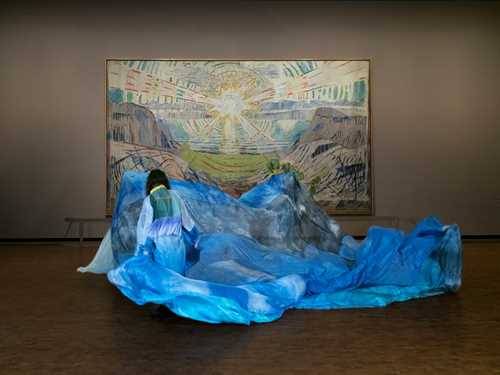// CANCELED // Klaus Mäkelä, Janine Jansen, Martin Fröst & the Oslo-Philharmonic at MUNCH

The event is cancelled. All ticket holders will be contacted and refunded.
Jean-Féry Rebel: Le Chaos fra Les Élémens
Sally Beamish: Distans
Unsuk Chin: Subito con forza
Ludwig van Beethoven: Symfoni nr. 6
Klaus Mäkelä, dirigent
Janine Jansen, fiolin
Martin Fröst, klarinett
British-born Sally Beamish (b.1956) draws on music from three countries in her new double concerto for violin, clarinet and orchestra – Scotland, where she lived for three decades, the Netherlands, Janine Jansen’s homeland, and Sweden, homeland of Martin Fröst. The work has been given the Swedish title Distans, and longing for loved ones is one of its core themes.
Jean-Féry Rebel (1666–1747) was an accomplished violinist and composed music across a variety of genres, including a string of choreographed symphonies. Chaos is the introduction to one of these, The Elements from 1738, which describes the chaos which reigns on the brink of creation. The work begins with a powerful dissonance, which stands unparalleled in 18th century music.
South-Korean composer Unsuk Chin (b. 1961) is one of the most esteemed composers for orchestra of our time. Ludwig van Beethoven (1770–1827) is one of her most significant sources of inspiration, and Subito con sforza is written on the occasion of the 250th anniversary of his birth, commissioned by the Concertgebouw Orchestra in Amsterdam. The short, contrast-filled work contains a number of references to Beethoven’s music, and is inspired by Beethoven’s sketchbooks, in particular the quote: “Major and minor. I am a winner.”
Beethoven adored nature, and was often inspired during his long walks, taken with a sketchbook under his arm. In his Symphony No. 6, also known as his Pastorale symphony, he offers a rich description of his impressions of nature. The symphony begins with a description of the feeling of happiness that comes with stepping out into the natural world. Later on, the listener hears the quiet flow of a brook, cheerful townspeople and a violent tempest before the idyllic ending.



